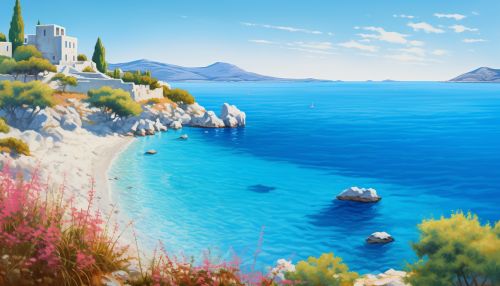Greek islands
Geography
The Greek Archipelago is a unique geographical feature of Greece, comprised of several thousand islands and islets scattered in the Aegean and Ionian Seas, a manifestation of the country's complex geological history. The islands form a significant part of Greece's physical geography, contributing to its maritime character.


Classification
The Greek islands are traditionally grouped into seven clusters: the Northeastern Aegean Islands, the Sporades, the Argo-Saronic Islands, the Cyclades, the Dodecanese, the Ionian Islands, and the Crete Island group. Each cluster has its unique characteristics, shaped by their geographical location, geological formation, and historical evolution.
Geology
The geological formation of the Greek islands is a result of various geological processes over millions of years, including tectonic activities, volcanic eruptions, and erosion. The islands exhibit a wide range of geological features, from the volcanic landscapes of Santorini and Nisyros to the limestone formations of the Ionian Islands.
Climate
The Greek islands experience a Mediterranean climate, characterized by hot, dry summers and mild, wet winters. However, microclimatic variations exist due to factors such as altitude, latitude, and proximity to the sea. For instance, the islands in the Aegean Sea are subject to the meltemi, a seasonal wind phenomenon.
Flora and Fauna
The Greek islands boast a rich biodiversity, with a variety of endemic species. The islands' isolation has led to the evolution of unique ecosystems, such as the cedar forests of Crete and the pine and oak forests of the Ionian Islands. The islands are also home to a variety of bird species, making them a significant destination for birdwatching.
History
The Greek islands have a long and rich history, with human habitation dating back to the Neolithic period. They have been the cradle of some of the most influential civilizations in history, including the Minoan civilization on Crete and the Mycenaean civilization in the Cyclades.
Culture
The culture of the Greek islands is a blend of various influences, shaped by their history, geography, and social structures. Each island group has its distinct traditions, dialects, music, and cuisine. The island culture is characterized by its maritime traditions, religious festivals, and the renowned Greek hospitality.
Economy
The economy of the Greek islands is primarily based on tourism, agriculture, and fishing. The islands' natural beauty, historical sites, and cultural heritage attract millions of tourists each year. Agriculture, particularly olive and grape cultivation, plays a significant role in the islands' economy.
Tourism
Tourism is a vital sector for the Greek islands, contributing significantly to their economy. The islands offer a diverse range of tourist experiences, from the vibrant nightlife of Mykonos to the tranquil beaches of the Ionian Islands, the archaeological sites of Crete, and the unique architecture of the Cyclades.
